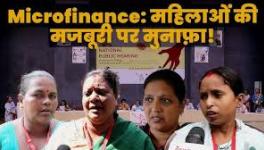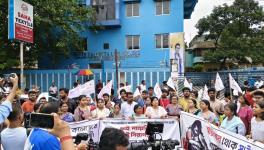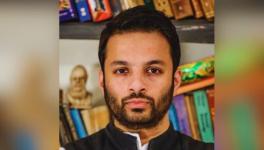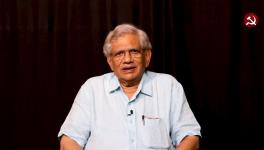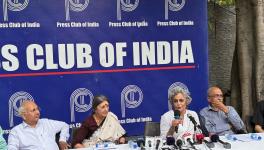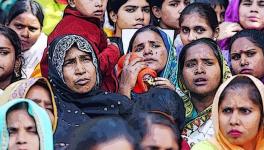“Understanding Inequality Was Critical in my Becoming Political”
A few years ago, as part of the Zubaan Oral Archives Project, independent researcher, writer and women’s rights activist, Sahba Husain spoke with several other women activists about the women’s movement in India.
In the first of this series of conversations, Sahba spoke to Brinda Karat, a leading political and women’s rights activist. Karat is a Politburo member of the Communist Party of India (Marxist) and was a Member of Parliament in the Rajya Sabha from 2005-2011. She was also the general secretary of the All India Democratic Women’s Association (AIDWA) between 1993-2004. Incidentally, this year also marks 40 years of AIDWA.
In the following excerpt, Brinda talks about her childhood, her political journey and more.
Sahba Husain: Brinda, please tell us about yourself — your childhood, family background and the beginning of your political journey.
Brinda Karat: I was born on 19th October 1947 in Kolkata and 1947 being the year we got our freedom, my mother, it seems told friends that it was a very special burden she was carrying because she could not dance the way she wanted to when India got her freedom. So that was the first comment made about me! I am one of four siblings, my elder brother and my sister and another sister. My father is from Punjab and my mother from Bengal. My mother died when I was very young in a terrible car accident when I was just five and that I guess, changed our lives terribly.
I guess if my mother were there we would have had some kind of a discipline but though my father was quite strong on discipline, he was a very liberal person so we had a free and you know, we could do what we wanted – of course we studied, we had study hours but you know we were not bound by all kinds of restrictions, either cultural or behavioral or anything like that. So those were years, now when I look back at it, those were very important years of my life. After a few years, my life changed because we were sent to a boarding school. I must’ve been eleven or twelve then. We went across the country to Dehradun, to Welham Girls School. I was terribly home sick in the beginning but then I made some very good friends. When I joined Welham, it had started 4-5 years earlier. So, it was an education itself just to be in a school with a principal like Grace Linnell, an Englishwoman who had decided not to get married, she believed strongly in women’s education so she left England and came to teach Muslim girls in Hyderabad and years later to Dehradun. She was tall and slim and she had very strong ideas about the upbringing of girls but she was not conservative about what a woman’s role was or what it should be. Grace Linell was an important influence in my life.
After being brought up by my father and my aunts and then moving to Welhams, I later went to the Miranda House college in Delhi University. I was there from 1963-66. I was very interested in drama so I spent almost all my free time in theatre. After I finished college I went to Calcutta and joined one or two drama clubs there and then my father told me, look it’s all very well what you are doing but you got to earn your own bread, my father was very committed to a work ethic. So he said, whatever it is, you have to be independent and be able to earn your own living. I thought of applying to Air India to get a job in the office, not to fly but to get a ground job. So I applied and sat for an interview and they hired me and then within six months or so I had a posting in London and I got transferred there. But when I got there in 1967 London was in the grip of a very strong political environment and a very anti-establishment mood among all the young people. My friends in London were all students, many of them from India. I was the only one working. I continued to work with Air India but I was getting more and more involved with political mobilization, basically against the American war in Vietnam, this was I think within two months of my coming to London and whoever I was talking to, they just talked politics. The real change in my life was trying to get into theatre for four years and getting totally political instead. And this was something I was just so drawn to. And then I started reading and I was introduced to Marxism that time and until then I was totally uneducated except for political science that we were taught in college in a very superficial way.
In London, I got very drawn into the political movement and then I went to America and met some of the groups there. But meeting all these groups – I was meeting a lot of anarchists and those from the Black Brotherhood and other black groups that were vey radical. And, also in London at that time a lot of Bengali students had come who literally had to leave (India) because they had joined the Naxalbari movement and they all had warrants against them. So I started thinking that I too must know more about India because it was so far all about what was happening in England, what was happening in France, what was happening in Germany, because all the people I was meeting were basically contextualizing all this within their own cultures and within their own countries. I was influenced by the ideology of Marxism but I wasn’t really much influenced by their political mobilizations so I felt that I needed to understand India more. So, I started reading more about India and whenever I came back to India (being in Air India, I used to get free tickets to India) I would get communist literature from here and then go back and read it although I understood very little of it. I had not yet met a single CPI-M supporter in London.
At that time in 1966-67, what was happening in Calcutta were these huge people’s mobilizations led by the CPI-M and the face of CPI-M at the time was Jyoti Basu. So, that was a very inspiring experience for me, to read about it and to see the way these huge mass mobilizations were taking place and how the Parliament and the state Assemblies were being used for political change. It was then that I started looking at the party, the CPI-M. I was now also making up my mind to quit my job and come back to India. I was in London for four years; I think it was 1971 or so. However, my father was deeply upset about it because he felt that I had a good job and I was financially independent – my father was in the corporate sector, he was chairman and managing director of a big company. However, I quit my job and came back to Calcutta and at that period there was no issue of women although in England at that time, women’s liberation and women’s mobilization were very critical and very assertive and they were very important in the kind of new thinking and new ideologies of the Left which were being promoted against the ‘old Left’ or the organized Left and the communist parties.
I must say I was not drawn to women’s issues then as I am now. I was just trying to understand inequality, this was crucial and the most important thing for me. It was critical in my becoming political, it was not at all women’s issues, it was the issue of inequality, the issue of justice, the issue of class and the issue of the rich and the poor, that was really crucial for me. I felt that this was not an issue because what was moving me was a very basic understanding of class that I was coming to, and looking at class society. That was really the main factor that I was trying to understand.
This is a lightly edited extract from an interview that was part of the Zubaan Oral Archiving Project. Republished here with permission from the publisher.
Courtesy: Indian Cultural Forum
Get the latest reports & analysis with people's perspective on Protests, movements & deep analytical videos, discussions of the current affairs in your Telegram app. Subscribe to NewsClick's Telegram channel & get Real-Time updates on stories, as they get published on our website.









